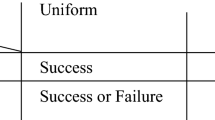Abstract
Yehezkel presents an interesting argument to resolve Goodman’s New Riddle of Induction, and in effect to claim that a purely syntactical theory of confirmation is possible. In this paper I suggest that Yehezkel’s argument relies on two premises not proven in his paper. The first premise is that if “a New Riddle of Deduction” can be formulated then there is no New Riddle of Induction. This premise seems to be wrong as I claim in part 2 of this paper. The second premise is that a New Riddle of Deduction can be formulated. Despite Yehezkel’s efforts to prove this claim, it seems to me false, or at least, unproven. I therefore conclude that there is no New Riddle of Deduction, and therefore, no actual resolution to the New Riddle of Induction.
Similar content being viewed by others
Notes
If one starts with the predicates “grue” and “bleen” — which applies to all things examined before t just in case they are blue but to other things just in case they are green — then one can define green (and blue) with these two predicates and the notion of time: the predicate “green” applies to all things examined before t just in case they are grue but to other things just in case they are bleen.
An extension of a predicate is the set of things for which the predicate holds true.
If The Duke of Devonshire is not such an element, then there is no problem with the validity of argument (1) because one of the premises is false either way — it is impossible, in that case, to present an interpretation in which the premises are all true, and the conclusion is false.
That is only if “gubs” has a semantic constancy. I suspect that Yehezkel understand as it has no semantics constancy, and since deductive validity presupposes semantic constancy of all predicates (and names) involved in the relevant argument, argument (1) is not valid as Yehezkel claims, but this understanding of “gubs” ends the discussion because a context involves such a predicate (no constant semantic) is not an extensional context and hence is not in the scope of elementary deductive logic.
References
Barker, S. F., & Achinstein, P. (1960). On the new riddle of induction. Philosophical Review, 69, 511–522.
Carnap, R. (1947). On the application of inductive logic. Philosophy and Phenomenological Research, 8, 133–148.
Goodman, N. (1945). A query of confirmation. Journal of Philosophy, 43(14), 383–385.
Goodman, N. (1954). Fact, fiction and forecast. Indianapolis: Hackett Publishing Company.
Yehezkel, G. (2016). The new riddle of induction and the new riddle of deduction. Acta Analytica, 31, 31–41.
Author information
Authors and Affiliations
Corresponding author
Rights and permissions
About this article
Cite this article
Israel, R. There is No New Riddle of Deduction: a Reply to Yehezkel. Philosophia 46, 311–318 (2018). https://doi.org/10.1007/s11406-017-9898-9
Received:
Revised:
Accepted:
Published:
Issue Date:
DOI: https://doi.org/10.1007/s11406-017-9898-9



